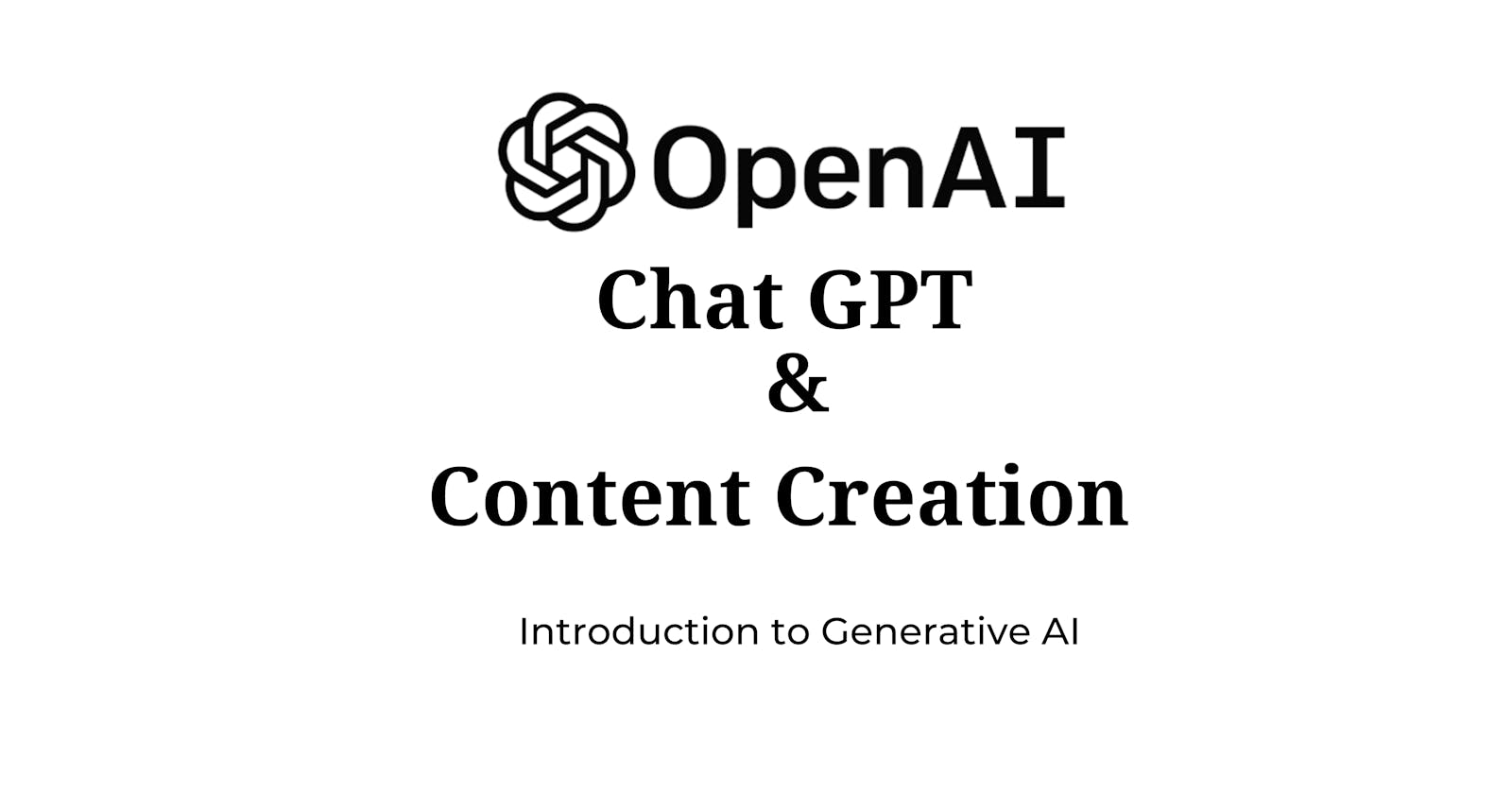Introduction
In recent years, and can I say recent months, artificial intelligence (AI) has made significant strides, transforming various industries. One area where AI has shown remarkable potential is content creation.
With AI's capabilities, another sub-category has been born which is Generative AI. Generative AI, also known as Generative Artificial Intelligence, is a subfield of artificial intelligence that focuses on using computer algorithms to generate outputs that resemble human-created content. This content can include text, images, graphics, music, computer code, and more.
Generative AI models like GPT (Generative Pre-trained Transformer) and Variational Autoencoders (VAEs) are built upon neural networks and deep learning methods. They employ a two-step process: training and generation.
The emergence of Generative AI can be attributed to several key developments which are:
Advancements in Deep Learning
Large-Scale Datasets
Pre-training and Fine-tuning
Research and Innovation
What ChatGPT Offers
ChatGPT, an advanced language model developed by OpenAI whose CEO happens to be Sam Altman, has emerged as a game-changer in this domain. In this blog post, we will explore the step-by-step impact of ChatGPT on the future of content creation, showcasing its potential to revolutionize the industry.
Unleashing Creativity: ChatGPT unleashes a new wave of creativity among content creators. With its ability to generate human-like text, it serves as an endless source of inspiration and ideas. Writers, bloggers, and marketers can interact with ChatGPT to brainstorm content topics, refine concepts, and explore different angles. This collaboration between human creativity and AI innovation propels content creation to new heights.
Streamlining Research: Research is a crucial aspect of content creation. ChatGPT proves invaluable by providing instant access to vast amounts of knowledge. Its ability to comprehend and analyze information means that content creators can efficiently gather insights, statistics, and supporting evidence for their articles or blog posts. The time-consuming task of sifting through numerous sources is significantly reduced, allowing creators to focus more on crafting compelling narratives.
Enhancing Writing Efficiency: One of the significant advantages of ChatGPT is its ability to expedite the writing process. Content creators can utilize the model to generate drafts, outlines, and even complete paragraphs. By leveraging the AI's capabilities, writers can allocate more time to refining and polishing their work. Additionally, ChatGPT can assist with grammar checks, suggest alternative sentence structures, and provide real-time feedback, enabling creators to enhance the quality and coherence of their content.
Multilingual Adaptability: In today's globalized world, content creators often face the challenge of catering to diverse audiences. ChatGPT offers a solution by supporting multiple languages. It enables creators to effortlessly generate content in different tongues, expanding their reach and engagement. This flexibility helps bridge language barriers and fosters communication across cultures, making content creation more inclusive and accessible.
Personalized Content Experiences: Understanding and catering to individual preferences is a key aspect of successful content creation. ChatGPT's ability to analyze user data and interactions makes personalization more effective than ever. By leveraging this AI-powered technology, content creators can tailor their content to specific demographics, optimizing engagement and fostering a deeper connection with their audience. From personalized recommendations to adaptive storytelling, ChatGPT empowers creators to deliver highly relevant and engaging content.
Ethical Considerations: As AI becomes more prevalent in content creation, ethical considerations come to the forefront. Content creators must remain vigilant and responsible when using AI-powered tools like ChatGPT. Ensuring transparency, authenticity, and accountability in content creation is paramount. Striking a balance between AI assistance and human creativity is crucial to maintaining the integrity and trustworthiness of the content produced.
Shortcomings of Generative AI and ChatGPT
Prone to Producing Inaccurate or Misleading Information
Since generative AI models are trained on large amounts of data, they can sometimes produce inaccurate or misleading information.
Generative AI, including models like ChatGPT, is prone to producing inaccurate or misleading information, a concern exacerbated by the phenomenon of "hallucinations." Hallucinations refer to the AI's tendency to generate content that appears plausible but lacks a factual basis.
This can be due to the model's training data, which often contains biased or incorrect information, and the model's inability to verify the accuracy of its responses. Users must exercise caution and critically evaluate the information generated by such systems, especially in contexts where factual accuracy is critical, as there's a risk of spreading misinformation or reinforcing existing biases.
This shows that generative AI outputs still need to be validated against reliable sources to ensure accuracy.
Limited Context and Understanding
While it can generate text that may appear coherent and contextually relevant, its understanding is often superficial and reliant on statistical patterns within its training data. Generative AI, including models like ChatGPT, exhibits a fundamental limitation in its ability to comprehend context and meaning.
It lacks true comprehension and common-sense reasoning abilities, which can lead to responses that are contextually incorrect or nonsensical, especially when faced with nuanced or complex queries.
Users should be mindful that these models may not fully grasp the depth of a conversation or accurately interpret the subtleties of language, making them unsuitable for tasks requiring a deep understanding of context or nuanced discussions.
Lack of Common Sense and Judgement
Generative AI models also exhibit deficiencies in common sense and sound judgment. There are instances where they produce outputs that lack coherence and are occasionally inappropriate in response to a given prompt.
OpenAI has made efforts to mitigate the generation of harmful content in ChatGPT through reinforcement learning. However, generative AI technology is still a considerable distance away from matching human-level common sense and judgment.
In summary, while generative AI, including ChatGPT, demonstrates significant potential, it remains susceptible to inaccuracies, lacks a nuanced understanding, and occasionally responds with poor judgment. Therefore, it is crucial to exercise caution and validate their outputs against reliable sources. Over time, as these models continue to advance, their limitations should progressively diminish.
Conclusion
The future of content creation is being reshaped by the integration of AI, with Chat GPT leading the charge. Its impact is evident in enhancing creativity, streamlined research, improved writing efficiency, multilingual adaptability, personalized content experiences, and ethical considerations.
As this AI technology continues to evolve, content creators like myself will find new and exciting ways to leverage its capabilities, ultimately elevating the quality and relevance of content across various platforms. Embracing the possibilities of ChatGPT opens doors to a new era of content creation that is innovative, efficient, and engaging.

